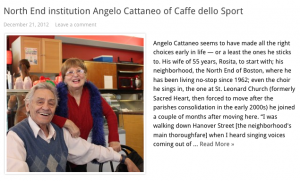A North End Institution: Angelo Cattaneo of Caffe’ dello Sport
CLICK ON THE IMAGE FOR FULL ON-LINE VERSION ON BOSTONIANO.INFO
 Angelo Cattaneo seems to have made all the right choices early in life — or a least the ones he sticks to.
Angelo Cattaneo seems to have made all the right choices early in life — or a least the ones he sticks to.
His wife of 55 years, Rosita, to start with; his neighborhood, the North End of Boston, where he has been living no-stop since 1962; even the choir he sings in, the one at St. Leonard Church (formerly Sacred Heart, then forced to move after the parishes consolidation in the early 2000s) he joined a couple of months after moving here. “I was walking down Hanover Street [the neighborhood’s main thoroughfare] when I heard singing voices coming out of a church,” he recalls in great detail. “I just entered and asked: ‘Need an extra voice?’ They said ‘Yes’, and here I am, still rehearsing and performing, 50 years later.”
Today, he can still hear the singing from his house or, even better, from his landmark Café dello Sport, a veritable Boston institution and the reason why he is universally known within the Italian community, and way beyond. The café (or bar as Italians call it, and Americans should too as it does have a hard liquor license) along with his home and church form Angelo’s life triangle, the longest side of which is probably 50 yards!
Yet this was not the product of an early choice: In fact, what today defines and identifies Angelo Cattaneo in the eyes of the neighborhood came at the end of a long jack-of-all-trades type career that started in 1950 in Argentina, where he served as a pressing irons maker in his early 20s, and finished in New York, where he commuted weekly for a while, as an Alitalia land services specialist. In between, he did a little of everything else: from mechanical engineering and door-to-door pottery salesman to cold cuts vendor and pizzeria owner. The café came at the very end, in 1989, as a post retirement activity/investment. A good one, it must be said.
The third apex of Angelo’s life map has not moved much either. In 1992, due to an unsustainable rent spike, it basically crossed the street from its original location — which later hosted café graffiti and now is home to the Damiano restaurant — to what today is probably the most strategic spot (the corner of Hanover and Prince) of the best preserved and most celebrated Italian-American neighborhood in the country.
Location, location, location, of course, but the fact that dello Sport has become an indisputable point of reference for North End strollers (locals and tourists alike) and most of all sport enthusiasts (during Italy’s team soccer games, chairs must be reserved in advance) is due to other factors as well.
“There is nothing studied or planned about this place,” says Angelo, now basically a supervisor of his son’s and daughter’s management. “We run it like we feel we should, spontaneously, from the heart.” In fact, the food, both on the sweet and savory side, although good, is not worth the trip, and especially the search for parking, and the coffee, according to many the best in town by far, only lives up to its name when the machine is operated by the right person.
Yet the flavor that beats the competition (of which there is absolutely no shortage these days) is that of a genuine, non-pretentious, Italian atmosphere and hospitality..
Regardless of marketing trends, Café dello Sport is completely “Made in Italy” (except for the seven flat-screen TV monitors), just like its owner, who, also thanks to his past as an Alitalia employee, makes his way there twice a year, on average. He goes to Bergamo, where he is from, and Salerno, home to his wife (“I miss the scent of my country,” he confesses). And when he doesn’t, he keeps informed and interested in everything coming from the old country. He vocally comments on it, too, on a daily basis, with his customers, often cracking jokes in the middle of serious arguments, while sitting at one of the tables in front of a crossword puzzle he never manages to finish.
“I know more about Italy than many Italians do,” Angelo brags. “Nowadays, over there, everybody is too busy complaining and whining about everything.”
At 82 years of age — which he wears seamlessly, thanks in part to a Trivial Pursuit-type memory, especially sharp when it comes to dates — he clearly does not have to be here every day. He wants to, though. Also, because he knows, even if he does not say it clearly, that his mere presence helps to keep his “creature” in line with the spirit that has made it, so far, so successful.
“The neighborhood has changed a great deal,” he reckons. “It has greatly improved in terms of quality of life, but most residents are no longer Italian and even the Italian restaurants [over 150 in 0.3 square miles] are gradually ‘falling into foreigners hands,’” he says half jokingly. “Which does not necessarily mean they don’t cook good food, but I am afraid that sooner or later this neighborhood will end up like many other Little Italys around the country.”
Then with a flash of pride in his eyes, he concludes “but this place won’t!”
